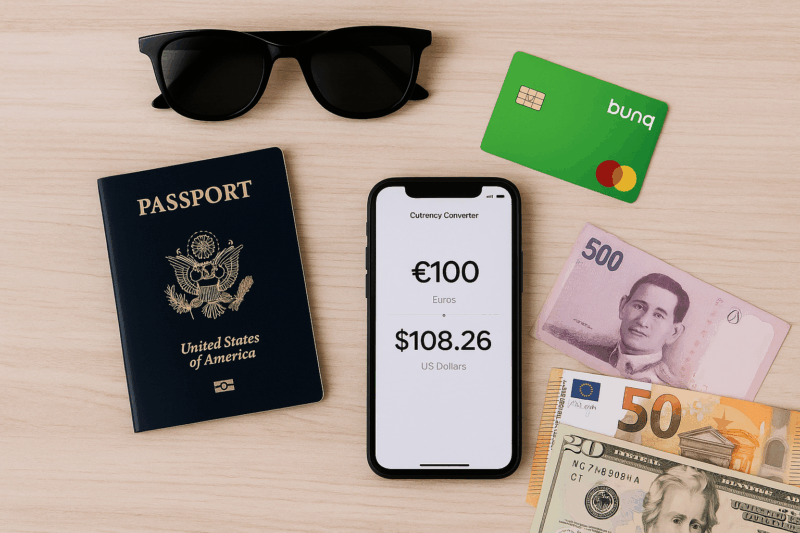Traveling abroad or shopping online often means dealing with currencies that are different from your home country’s. While this may seem straightforward—your card gets charged, and your bank handles the rest—the reality is that small decisions at the checkout can save (or cost) you significant amounts over time.
Whether you’re exploring a new country or purchasing from a foreign website like Amazon.co.uk while living in the Eurozone, the following tips will help you avoid hidden fees, unfair exchange rates, and unnecessary charges.
1. Use a Modern Multi-Currency Card
Traditional banks typically charge a currency conversion fee of 2–3% on every foreign transaction, on top of using their own less favorable exchange rates. Over a holiday or a year of online shopping, this adds up.
Cards like bunq solve this problem by:
- Offering real-time exchange rates that are close to interbank levels.
- Charging no hidden fees on everyday purchases.
- Allowing you to hold and exchange multiple currencies directly in the app.
If you travel regularly or shop internationally, using a modern card like bunq should be your default choice.
2. Always Pay in the Local Currency
When offered the option to pay in your home currency or the local currency, always choose the local currency.
Many merchants and ATMs use a system called Dynamic Currency Conversion (DCC). At first, it looks helpful—you see the amount in your familiar home currency. But behind the scenes, the provider applies its own inflated exchange rate, often adding 4–5% on top of your purchase.
Example:
- Paying €100 worth of goods in Thailand using DCC could cost you €105–€106.
- Paying in Thai Baht and letting bunq handle the conversion would give you the fairer rate.
Rule of thumb: Local currency always wins.
3. ATM Withdrawals: Choose Checking or Savings
When withdrawing money abroad, some ATMs ask whether to charge your credit, checking, or savings account. Choose either checking or savings. Selecting “credit” may result in additional fees or failed withdrawals.
Also remember:
- ATM prompt with conversion vs. without conversion → Always choose without conversion. Otherwise, you fall into the same DCC trap described above.
4. Know Your Card’s Limits and Markups
While bunq gives you flexibility with multiple currencies, it’s important to know the conditions that apply:
- Some plans include free ATM withdrawals up to a limit; beyond that, a small fee applies.
- Currency conversion is generally done at live rates with no added spread, though bunq may pass on a minor markup for less liquid currencies.
- As with most providers, weekend or off-market conversions may come with a small buffer to protect against volatility when Forex markets are closed.
To maximize savings, exchange during weekdays if you know you’ll need cash abroad.
5. Watch Out for Hidden Fees in Online Shopping
Shopping from foreign websites comes with the same pitfalls:
- Always pay in the website’s native currency instead of converting to yours at checkout.
- Check if your card provider charges international processing fees (bunq plans do not, unlike many traditional banks).
- For recurring purchases (e.g., subscriptions), make sure the correct currency is set from the start to avoid repeated conversion charges.
6. Optimize Subscriptions and Recurring Payments
Streaming platforms, software subscriptions, and cloud services often price differently depending on the billing country. Paying in the service’s native currency with bunq avoids repeated conversion fees. In some cases, you may even benefit from lower regional pricing, provided the service allows it.
7. Pre-Load and Budget in Foreign Currencies
If you know you’ll spend in USD, GBP, or other currencies, bunq lets you hold balances in those currencies. You can top up when rates are favorable and then spend directly from that balance abroad. This not only avoids conversion surprises but also doubles as a budgeting tool, since you can cap your spend in advance.
8. Use FX Alerts and Automation
Exchange rates fluctuate daily, and if you have predictable foreign expenses—like rent, tuition, or freelancer payments—you can save by converting at the right time. Bunq allows you to set rate alerts or automate conversions when rates hit your preferred target. This feature effectively gives you a lightweight hedging tool without needing a broker account.
9. Extra Tips to Save More
- Withdraw larger amounts at once rather than many small ATM withdrawals, to minimize per-transaction fees.
- Use local cash sparingly if digital payments are widely accepted—contactless payments with a no-fee card are often safer and cheaper.
- Keep a backup card in case your primary one is declined, especially in regions with less reliable banking infrastructure.
- Check your app notifications after each transaction to ensure you were charged the correct amount.
Final Thoughts
Foreign currency transactions don’t have to be confusing or costly. By sticking to a few simple rules—use the right card, always pay in local currency, avoid DCC, pre-load foreign balances when possible, and understand your provider’s limits—you can save money and avoid unpleasant surprises.
If you want the simplest way to manage all of this, bunq is one of the best options available today. It’s built for travelers, online shoppers, and anyone who deals with multiple currencies regularly.
The next time you’re abroad or shopping online, follow these tips and keep more money in your pocket rather than handing it to banks and ATM providers.
Do you have other tried-and-tested strategies for saving money on foreign transactions? Share them in the comments below.


Leave a Reply